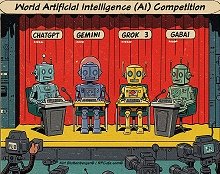Electronics & Technology
- See Full List of AI Topics -
The left-hand rule of magnetism is a fundamental concept in physics that is used
to determine the direction of the magnetic field around a moving charged particle,
such as an electron. It is based on the relationship discovered by physicist
Hans Christian Ørsted between the direction of the
magnetic force acting on the particle and the direction of the magnetic field.
The left-hand rule of magnetism states that if you point your left thumb in the
direction of the particle's velocity, and your left fingers in the direction of
the magnetic field, the direction of the magnetic force can be determined by the
direction of your extended palm. Specifically, if the palm is facing downwards,
the direction of the magnetic force will be downwards; if the palm is facing upwards,
the direction of the magnetic force will be upwards.
This rule is important because the interaction between moving charged particles
and magnetic fields is the basis for many important applications in physics and
engineering, such as particle accelerators, electric motors, and generators. The
direction of the magnetic force acting on a charged particle can also affect the
behavior of nearby particles and can be used to control the motion of charged particles.
The left-hand rule of magnetism is related to another important concept in physics,
known as the right-hand rule of magnetism. The right-hand rule of magnetism is used
to determine the direction of the magnetic field around a magnet, based on the direction
of the magnetic force acting on a moving charged particle.
While the left-hand rule of magnetism may seem like a simple concept, it is a
crucial tool for understanding the behavior of magnetic fields and charged particles.
By using this rule to determine the direction of the magnetic force acting on a
particle, physicists and engineers can design and optimize a wide range of systems
and devices that rely on the interaction between magnetic fields and charged particles.
 This content was generated by primarily
with the assistance of ChatGPT (OpenAI), and/or
Gemini (Google), and/or
Arya (GabAI), and/or Grok
(x.AI), and/or DeepSeek artificial intelligence
(AI) engines. Review was performed to help detect and correct any inaccuracies; however,
you are encouraged to verify the information yourself if it will be used for critical
applications. In all cases, multiple solicitations to the AI engine(s) was(were)
used to assimilate final content. Images and external hyperlinks have also been
added occasionally - especially on extensive treatises. Courts have ruled that AI-generated
content is not subject to copyright restrictions, but since I modify them, everything
here is protected by RF Cafe copyright. Many of the images are likewise generated
and modified. Your use of this data implies an agreement to hold totally harmless
Kirt Blattenberger, RF Cafe, and any and all of its assigns. Thank you. Here is
Gab AI in an iFrame. This content was generated by primarily
with the assistance of ChatGPT (OpenAI), and/or
Gemini (Google), and/or
Arya (GabAI), and/or Grok
(x.AI), and/or DeepSeek artificial intelligence
(AI) engines. Review was performed to help detect and correct any inaccuracies; however,
you are encouraged to verify the information yourself if it will be used for critical
applications. In all cases, multiple solicitations to the AI engine(s) was(were)
used to assimilate final content. Images and external hyperlinks have also been
added occasionally - especially on extensive treatises. Courts have ruled that AI-generated
content is not subject to copyright restrictions, but since I modify them, everything
here is protected by RF Cafe copyright. Many of the images are likewise generated
and modified. Your use of this data implies an agreement to hold totally harmless
Kirt Blattenberger, RF Cafe, and any and all of its assigns. Thank you. Here is
Gab AI in an iFrame.
AI Technical Trustability Update
While working on an update to my
RF Cafe Espresso Engineering Workbook project to add a couple calculators about
FM sidebands (available soon). The good news is that AI provided excellent VBA code
to generate a set of Bessel function
plots. The bad news is when I asked for a
table
showing at which modulation indices sidebands 0 (carrier) through 5 vanish,
none of the agents got it right. Some were really bad. The AI agents typically explain
their reason and method correctly, then go on to produces bad results. Even after
pointing out errors, subsequent results are still wrong. I do a lot of AI work
and see this often, even with subscribing to professional versions. I ultimately
generated the table myself. There is going to be a lot of inaccurate information
out there based on unverified AI queries, so beware.
Electronics & High Tech
Companies | Electronics &
Tech Publications | Electronics &
Tech Pioneers | Electronics &
Tech Principles |
Tech Standards Groups &
Industry Associations | Societal
Influences on Technology
|








